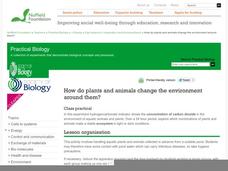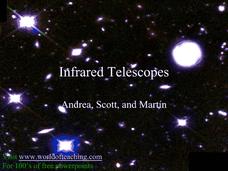Curated OER
As the Sun Burns
High schoolers test commercial sunscreens or sunglasses for accuracy of their Sun Protection Factor. They devise a method for testing UV beads with a visual clues which they publish as research. They investigate occupations such as...
Curated OER
Creating and Analyzing Graphs of Tropospheric Ozone
Students create and analyze graphs using archived atmospheric data to compare the ozone levels of selected regions around the world.
Curated OER
Heat Currents
Pupils using a slide made out of aluminum foil and pin holes observe visible light.
Curated OER
Create Your Own Cloud
Learners explore and analyze weather conditions, climates, compositions and characteristics of the atmosphere and weather patterns. They explain in detail the water cycle and its relationship to weather patterns. A lab experiment is...
Curated OER
Why is the Sky Blue?
Students explore diffusion or scattering of light. In this physics lesson plan, students explain why the sky is blue and sunsets/sunrises are red.
Curated OER
Gravity and Layers of Air
Students actively look and listen as their teacher provides transparencies to show how the atmosphere is made up of layers. For this atmosphere lesson plan, students discuss the atmosphere in terms of layers and how gravity pulls...
Curated OER
Create a Cloud in a Jar (Hands-on Version)
Students examine the conditions necessary for cloud formation. In this clouds lesson students complete an activity that shows them atmospheric pressure.
Curated OER
Frozen Film
Students discover how light reflects off surfaces. In this hands-on demonstration, students examine how variations in color are produced by light interference.
Curated OER
Making Clouds: Aerosol-Cloud Interactions in a Beaker
Students observe a teacher demo on how clouds form. In this earth science lesson, students discover how cloudiness affects relative humidity. They explain the scattering of light by clouds.
Curated OER
Tread Lightly: Global Climate Change Debate
Students participate in a group simulation to negotiate their country's stance on climate change initiatives at the U.N. In this climate change lesson, students write statements and engage in negotiations to create climate change policy....
National Wildlife Federation
I’ve Got the POWER! Solar Energy Potential at Your School
Should every school have solar panels? The 19th lesson in a series of 21 has scholars research the feasibility of using solar panels at their school. They begin by gathering data on the solar energy in the area before estimating the...
Wild BC
The Greenhouse Effect: The Role of CO2
Though this is meant to be second in a two-part lesson, the two are not dependent on each other. Pupils play the roles of visible light rays, light or dark surfaces, and carbon dioxide molecules. They interact and react according to...
Curated OER
Greenhouse in a Bottle
Young atmospheric scientists create models of an atmosphere with and without clouds to determine the effect of cloud cover on Earth's temperatures, as well as figuring out whether dark or light surfaces absorb more energy. You may wish...
Curated OER
Photo Synthesis and Transpiration
Middle schoolers germinate pea seeds and plant the seeds. They experiment with different amounts of light and darkness on the plant growth.
Curated OER
How Do Plants and Animals Change the Environment Around Them?
If you have elodea and snails in your classroom aquarium, or if you have access to a pond with these organisms, your young biologists can set up a controlled experiment to determine how certain ecosystems respond in light and dark...
Carnegie Mellon University
How Power Plants Work 2
In this second of three lessons on power plants, future engineers find out how we generate electricity and how coal-powered plants operate. They work in small groups to make electromagnet generators to light LED bulbs. A set of...
Curated OER
Orbits Worksheet #1
A diagram of Earth's path around the sun, including the position of the moon, is displayed at the top of the worksheet. Five multiple questions get astronomers to analyze the diagram considering what is going on in the solar system. Use...
Curated OER
Infrared Telescope
Most of the twenty slides in this presentation include photographs or diagrams, making it an eye-catching way to teach about infrared telescopes. The pros and cons of using infrared light to study outer regions of space are explained....
Curated OER
Energy Efficiency Ambassadors
Students compare two products that provide the same function but require different amounts of energy. In this energy efficiency lesson plan students research and demonstrate energy efficiency in action and how it applies to...
Curated OER
The Incredible Light Bulb-Egg Drop Challenge
Students examine how spacecraft land on Mars. Using eggs or lightbulbs, they design a craft that withstand a drop from a table or ladder, competing in groups to see which module demonstrates the most successful landing.
American Museum of Natural History
What is Astronomy?
Go study the universe. Pupils learn seven aspects about astronomy and astronomers. They begin to learn about constellations; distance and motion between objects; gravity; the electromagnetic spectrum; dark matter and energy; and teams of...
National Wildlife Federation
Wherefore Art Thou, Albedo?
In the sixth lesson in a series of 21, scholars use NASA data to graph and interpret albedo seasonally and over the course of multiple years. This allows learners to compare albedo trends to changes in sea ice with connections to the...
Curated OER
Frozen Film
Students are introduced to the topic of light interference through this hands-on activity. They observe how light reflects off two surfaces and then meets to form an interesting variation of color on a film surface.
Curated OER
Simple Organic Compounds
In this organic compounds activity, students read about the development of chlorofluorocarbons and the breakdown of this compound in the atmosphere. Students complete 2 short answer questions.























